The Best 10 Alternatives to Ivanti Endpoint Security (+ Pricing & Reviews)
Twingate Team
•
Jul 27, 2024

Ivanti Endpoint Security provides comprehensive protection for organizational devices and the data they access, blocking threats like ransomware and phishing. While it offers robust features, it might not be the choice for everyone. This article explores the importance of secure access to private resources for distributed workforces.
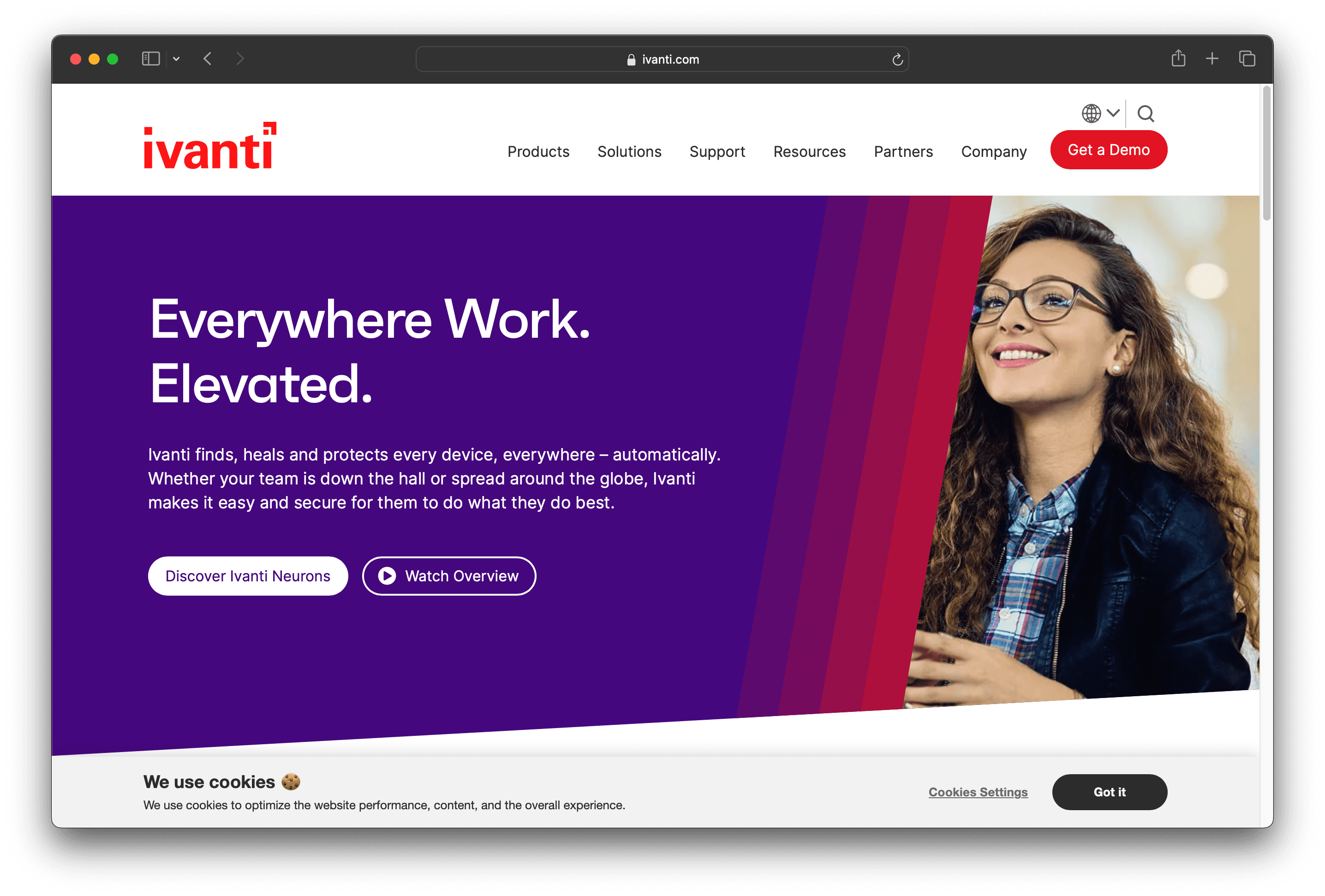
10 Alternatives to Ivanti Endpoint Security
1. Carbon Black
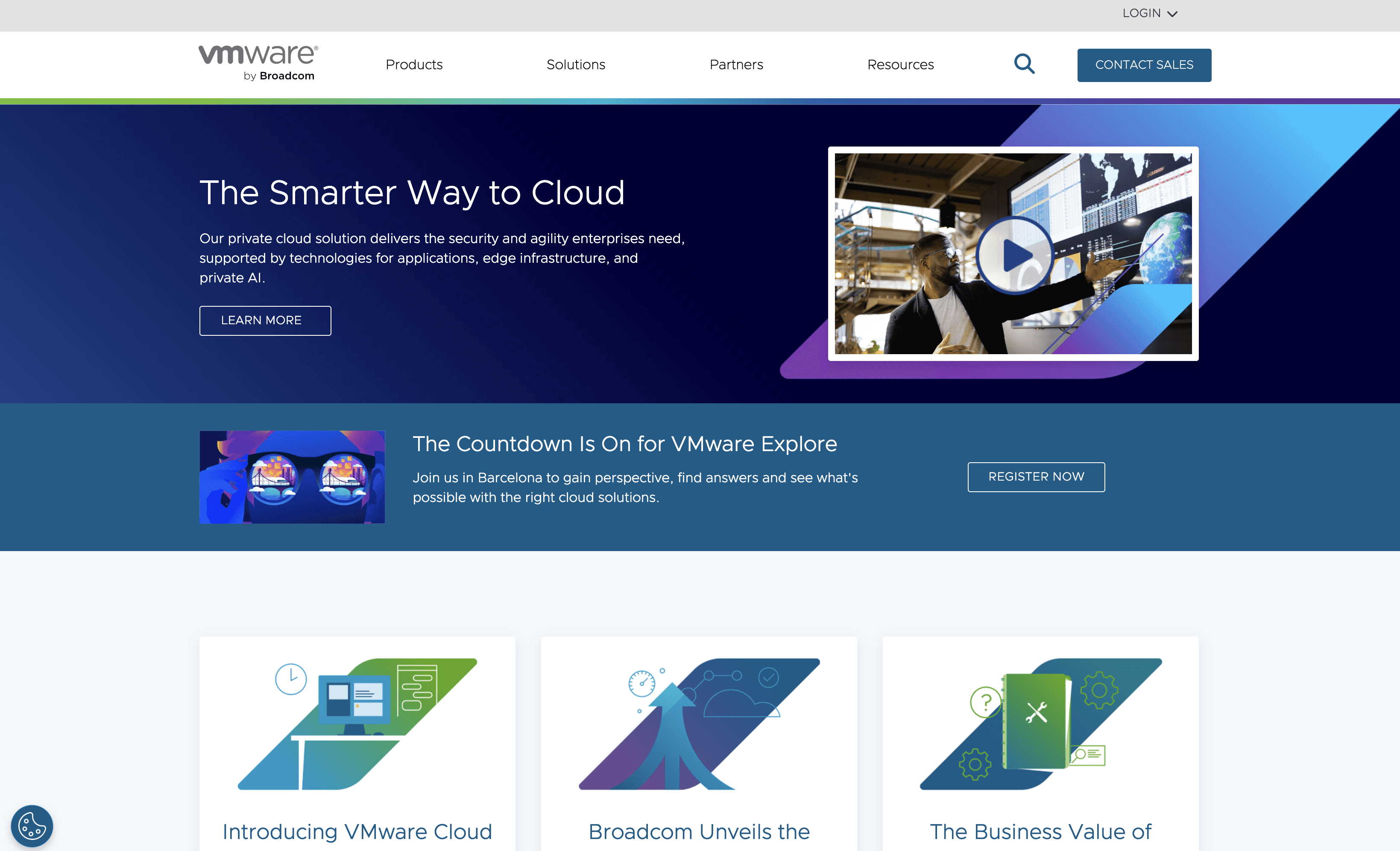
Carbon Black is a cybersecurity solution designed to protect endpoints from advanced threats. It offers real-time visibility and comprehensive threat detection, making it suitable for businesses of all sizes. With its focus on proactive security measures, Carbon Black aims to safeguard critical data and systems effectively.
Carbon Black Pricing
Carbon Black's pricing is not public. Contact their support for more info.
Carbon Black Reviews
Carbon Black has an overall rating of 4.3 out of 5 stars based on 37 reviews. Users appreciate its ease of installation and robust protection features. Check out more of our reviews here!
Pros and Cons of Carbon Black
Pros:
Carbon Black offers robust cybersecurity protection, effectively defending against ransomware and emerging threats, making it a reliable choice for safeguarding critical data.
Users appreciate the ease of installation, which simplifies the deployment process and reduces the time required to get the system up and running.
The platform provides comprehensive monitoring capabilities, allowing for real-time visibility into potential threats and ensuring proactive security measures.
Cons:
Some users report issues with agent removal, which can complicate the process of uninstalling the software from devices.
There are complaints about complex installation procedures, which may require additional technical expertise and time to complete.
Delay issues have been noted, potentially affecting the performance and responsiveness of the security platform during critical operations.
2. Vipre EDR
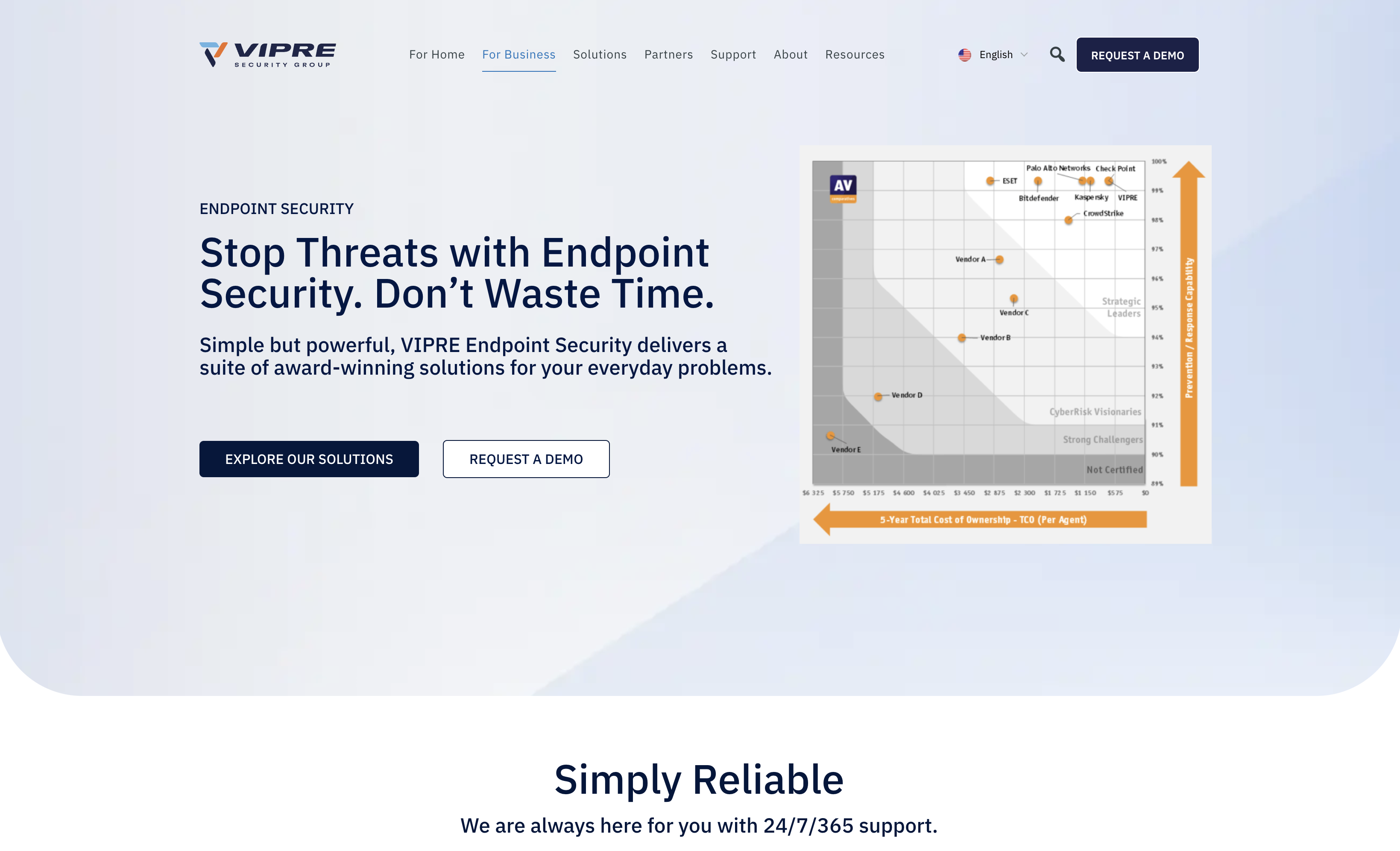
Vipre EDR is a cybersecurity solution designed to protect endpoints with advanced threat detection and response capabilities. It focuses on ease of installation, AI-powered investigation, and mobile accessibility, making it suitable for businesses of all sizes. Vipre EDR aims to provide comprehensive security with minimal complexity.
Vipre EDR Pricing
Vipre EDR's pricing is not public. Contact their support for more info.
Vipre EDR Reviews
Vipre EDR has an overall rating of 4.2 out of 5 stars based on 15 reviews. Users appreciate its ease of installation and robust threat detection. Check out more of our reviews here!
Pros and Cons ofVipre EDR
Pros:
Vipre EDR offers easy installation and use, ensuring that even non-technical users can set it up without hassle.
Its ransomware prevention and rollback feature uses AI to detect and neutralize threats in real-time, providing robust protection.
With a complete view of threat behavior, users can quickly identify and remediate security issues from a centralized dashboard.
Cons:
Some users report limited reviews, making it difficult to gauge the product's performance based on user feedback.
The complexity of advanced features may require additional training for full utilization, posing a challenge for smaller teams.
There are concerns about limited features on the claimed profile, suggesting the need for more comprehensive information and user engagement.
3. Symantec
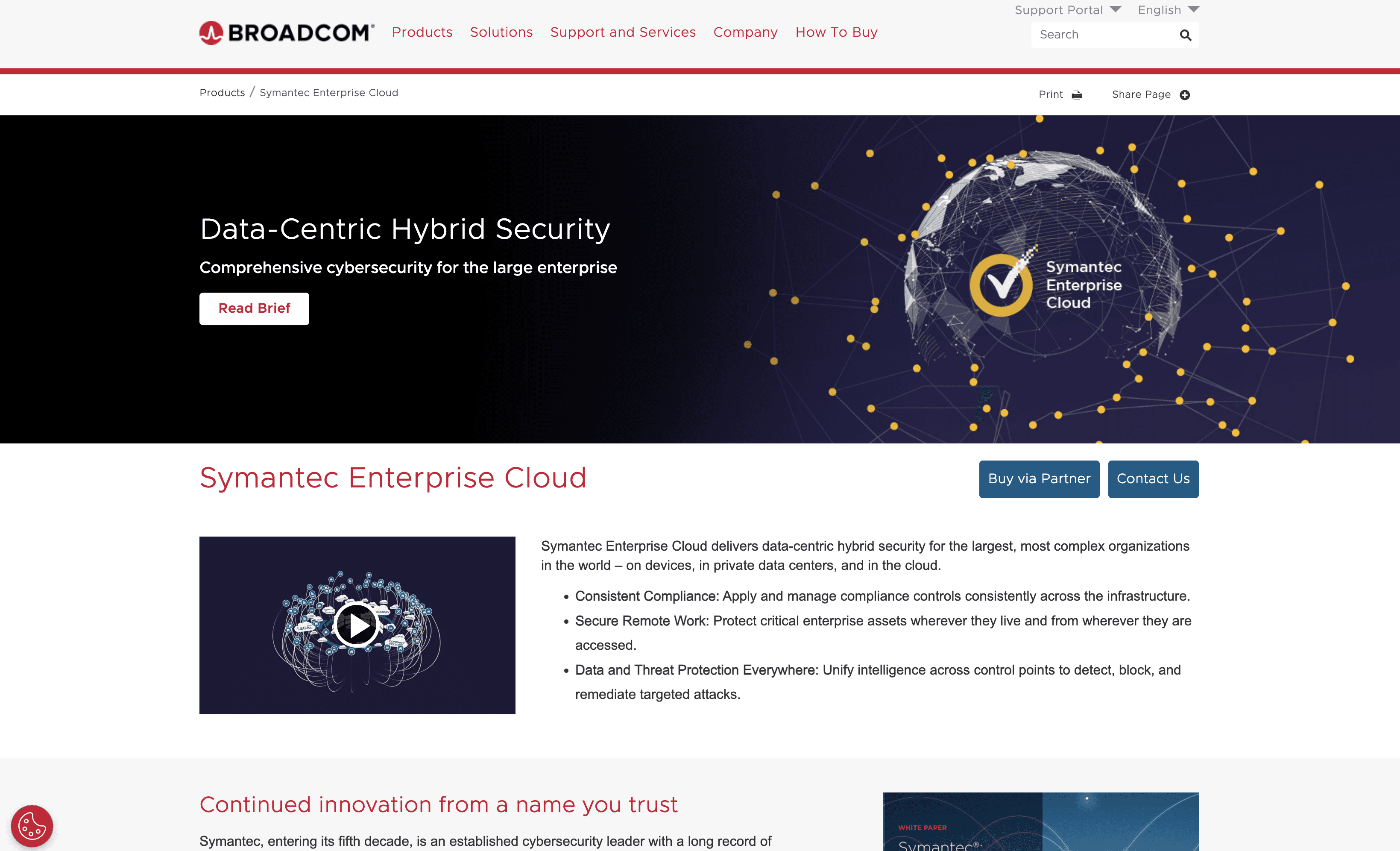
Symantec is a cybersecurity solution designed to protect large enterprises with data-centric hybrid security. It offers comprehensive protection across devices, private data centers, and the cloud. With advanced AI algorithms and seamless integration capabilities, Symantec aims to safeguard critical assets and ensure compliance across the infrastructure.
Symantec Pricing
Symantec's pricing is not public. Contact their support for more info.
Symantec Reviews
Symantec has an overall rating of 4.2 out of 5 stars based on 15 reviews. Users appreciate its comprehensive protection and ease of integration. Check out more of our reviews here!
Pros and Cons of Symantec
Pros:
Comprehensive Security: Symantec offers data-centric hybrid security, protecting devices, private data centers, and the cloud.
Consistent Compliance: Manages compliance controls uniformly across the entire infrastructure, ensuring regulatory adherence.
Secure Remote Work: Safeguards critical enterprise assets, enabling secure access from any location.
Cons:
Complexity for Small Enterprises: Advanced features may overwhelm smaller organizations, making it less suitable for them.
Potential Overhead: Extensive security measures can introduce additional management and resource allocation challenges.
Migration Challenges: Transitioning between on-premises and cloud environments may pose difficulties for some organizations.
4. Cisco Secure Endpoint
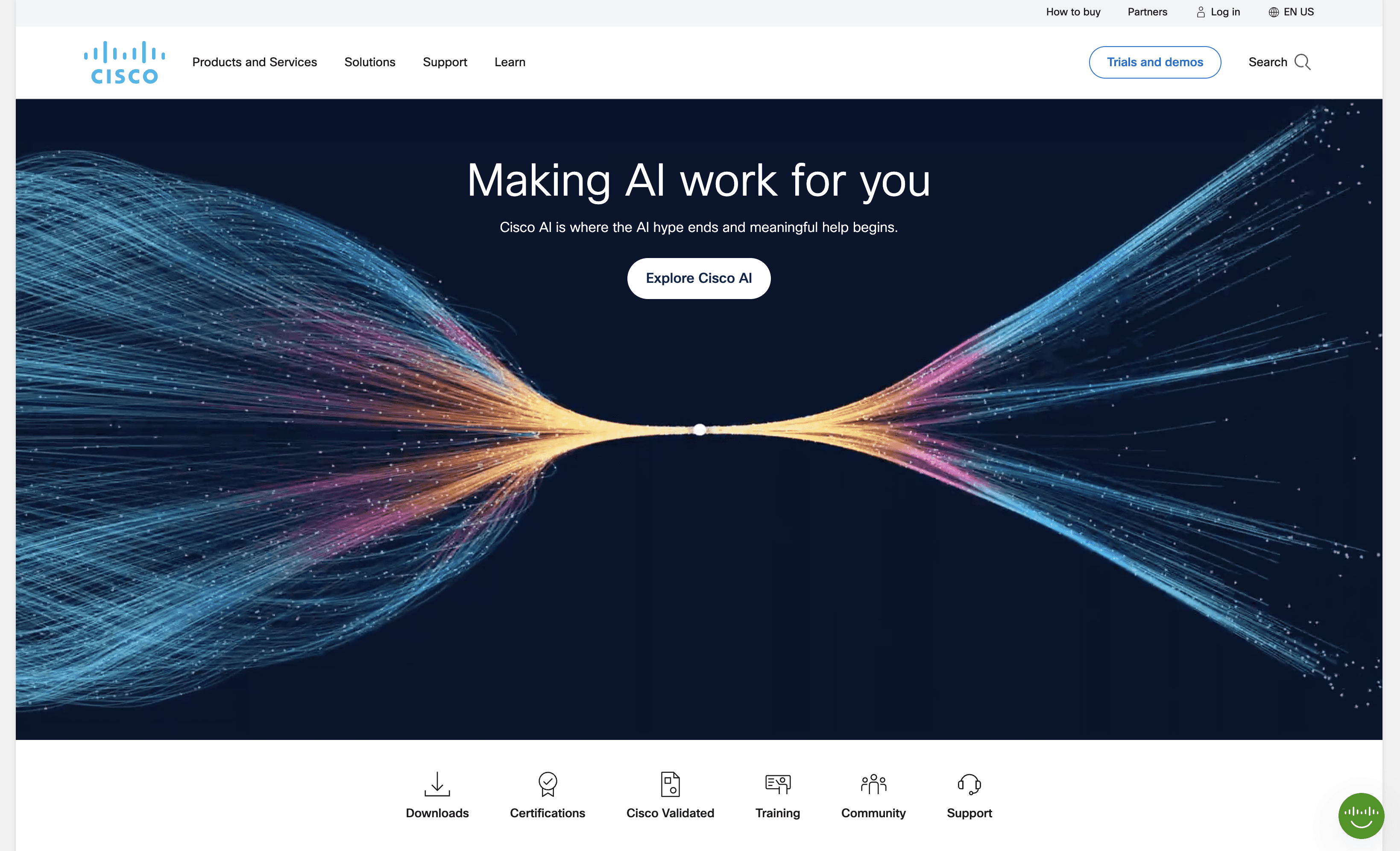
Cisco Secure Endpoint is a cloud-native solution designed to provide advanced endpoint security. It focuses on quick detection, response, and recovery from attacks, reducing remediation times significantly. With features like powerful EDR capabilities and integrated threat hunting, it aims to streamline investigations and enhance overall security.
Cisco Secure Endpoint Pricing
Cisco Secure Endpoint's pricing is not public. Contact their support for more info.
Cisco Secure Endpoint Reviews
Cisco Secure Endpoint has an overall rating of 4.5 out of 5 stars based on 21 reviews. Users appreciate its ease of use and comprehensive protection. Check out more of our reviews here!
Pros and Cons of Cisco Secure Endpoint
Pros:
Powerful EDR Capabilities: Built-in endpoint detection and response, threat hunting, and risk-based vulnerability management.
Streamlined Investigations: Quick answers about endpoints with Orbital Advanced Search capability.
Integrated XDR Capabilities: Unified view, simplified incident management, and automated playbooks with the SecureX platform.
Cons:
Complexity: The integration of multiple advanced features might be complex for some users to manage.
Cost: High-end security solutions like Cisco Secure Endpoint can be expensive, which might be a concern for smaller organizations.
Learning Curve: The advanced capabilities and integrations might require significant training and expertise to utilize effectively.
5. Absolute Secure Endpoint
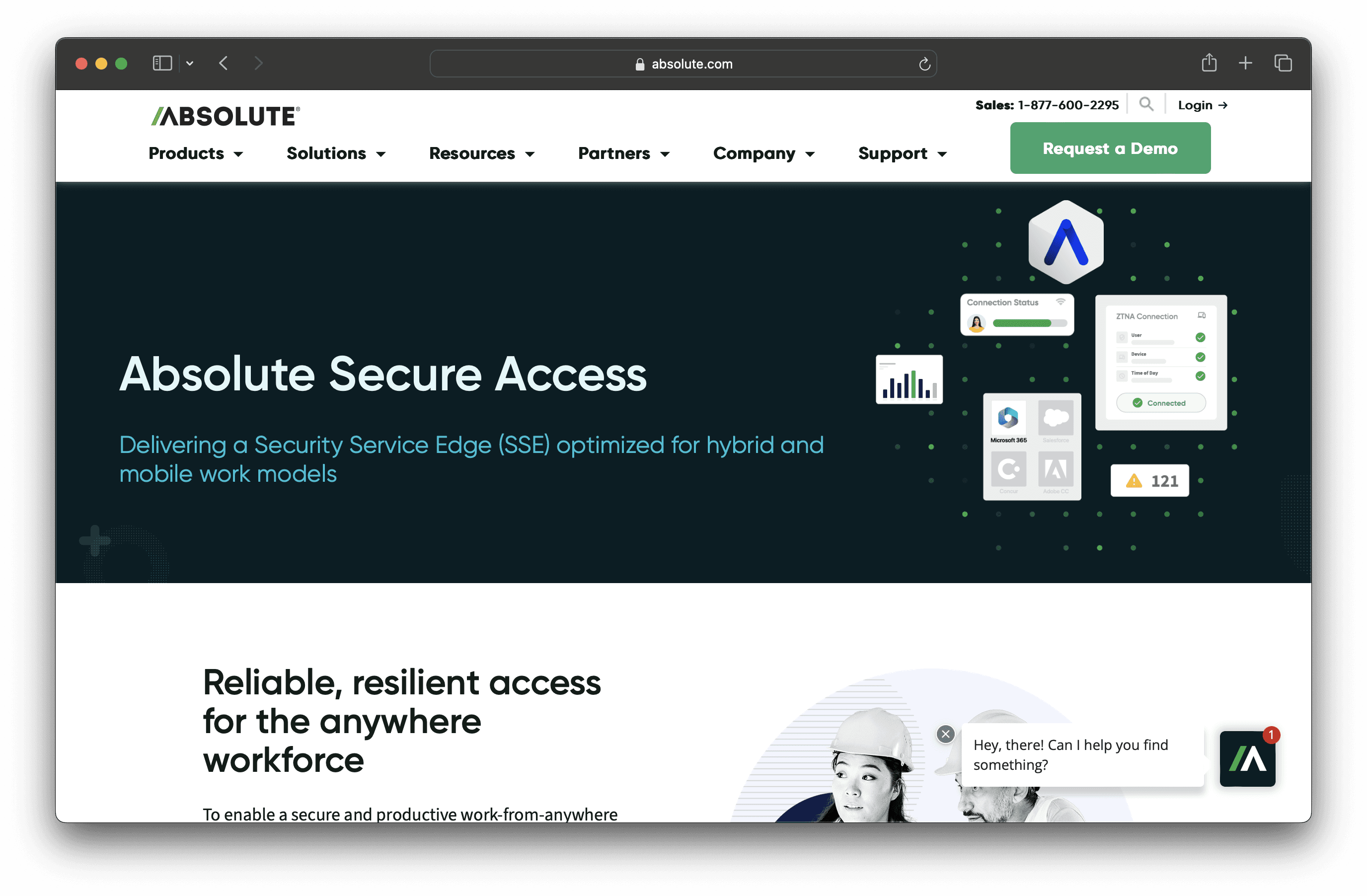
Absolute Secure Endpoint is a cybersecurity solution designed to protect devices with advanced threat detection and response. It offers features like self-healing applications and real-time visibility, ensuring robust security for businesses of all sizes. With its focus on ease of use, Absolute aims to simplify endpoint protection.
Absolute Secure Endpoint Pricing
Absolute Secure Endpoint's pricing is not public. Contact their support for more info.
Absolute Secure Endpoint Reviews
Absolute Secure Endpoint has an overall rating of 4.6 out of 5 stars based on 307 reviews. Users appreciate its robust security features and ease of use. Check out more of our reviews here!
Pros and Cons of Absolute Secure Endpoint
Pros:
Comprehensive Device Management: Tracks hardware, monitors device leasing, and reports on installed software, ensuring full visibility and control over all endpoints.
Security Posture Assessment: Provides encryption and anti-malware status reporting, helping organizations maintain a strong security posture.
Remote Actions: Allows remote freezing and data deletion from devices, offering robust measures to protect sensitive information.
Cons:
OS Support Limitations: Some features are limited to specific operating systems, which may restrict functionality for diverse environments.
Feature Availability: Certain advanced features are only available in higher-tier packages, potentially increasing costs for full functionality.
Geographic Restrictions: Some services, like the stolen device recovery guarantee, are limited to specific regions, reducing global applicability.
6. Microsoft Defender for Endpoint
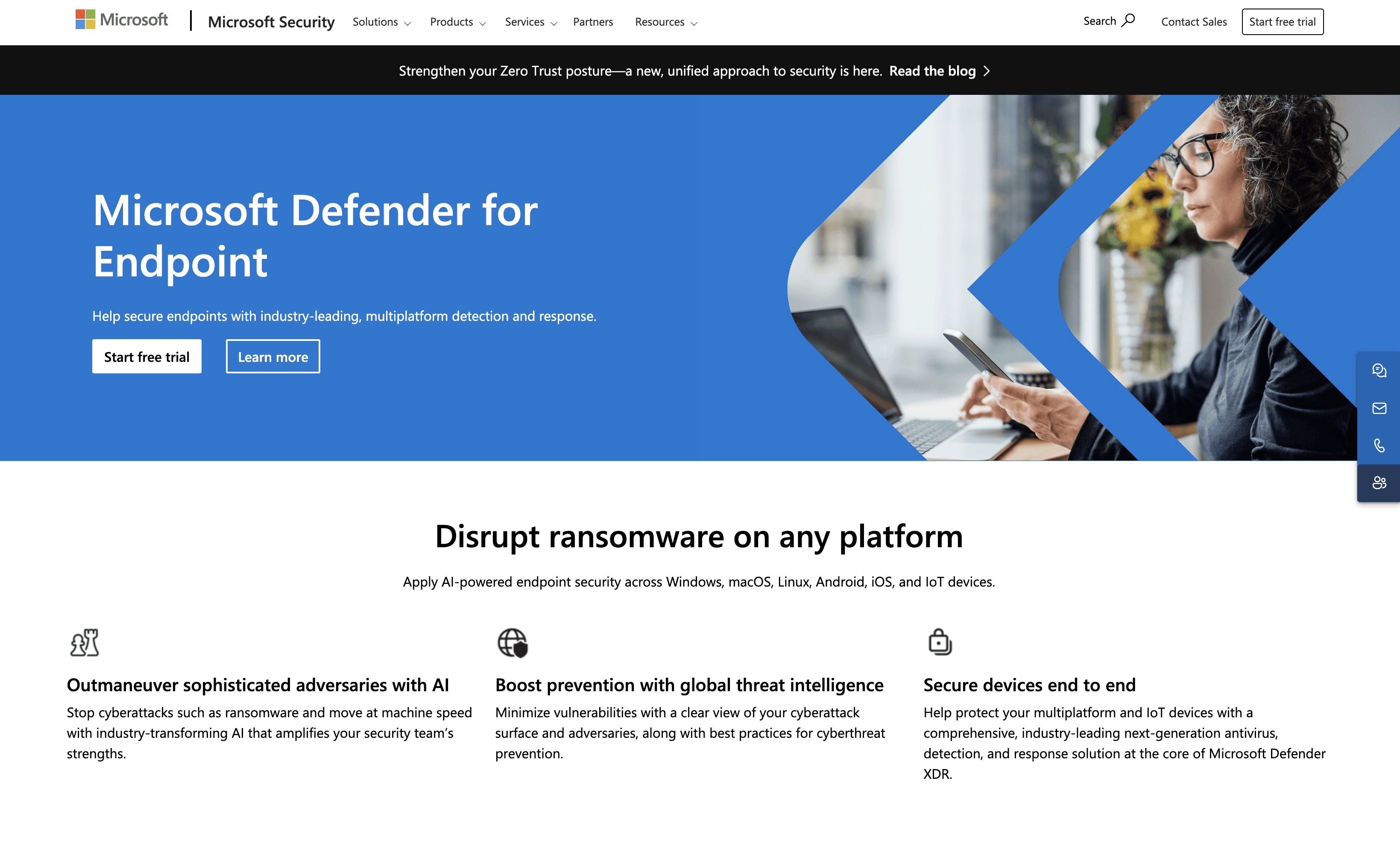
Microsoft Defender for Endpoint is a security solution designed to protect endpoints with industry-leading detection and response capabilities. It offers multiplatform support, AI-powered security, and global threat intelligence, ensuring comprehensive protection for businesses of all sizes. The solution aims to simplify endpoint security while providing robust defense mechanisms.
Microsoft Defender for Endpoint Pricing
Microsoft Defender for Endpoint P1: Included with Microsoft 365 E3.
Microsoft Defender for Endpoint P2: Included with Microsoft 365 E5.
Microsoft Defender for Endpoint Reviews
Microsoft Defender for Endpoint has an overall rating of 4.4 out of 5 stars based on 303 reviews. Users appreciate its comprehensive security features and ease of use. Check out more of our reviews here!
Pros and Cons of Microsoft Defender for Endpoint
Pros:
AI-Powered Security: Utilizes artificial intelligence to detect and neutralize cyber threats, enhancing the security team's efficiency.
Global Threat Intelligence: Offers a comprehensive view of the cyberattack landscape, providing actionable insights and best practices.
Comprehensive Protection: Delivers next-gen antivirus, detection, and response across multiple platforms, including IoT devices.
Cons:
Complexity: Advanced features may require significant expertise and training, posing challenges for less experienced users.
Cost: High-end security solutions, especially those included with Microsoft 365 E5, can be expensive for smaller organizations.
Resource Intensive: Managing and deploying such a robust security solution demands dedicated IT staff and infrastructure.
7. Eset Endpoint Protection Advanced
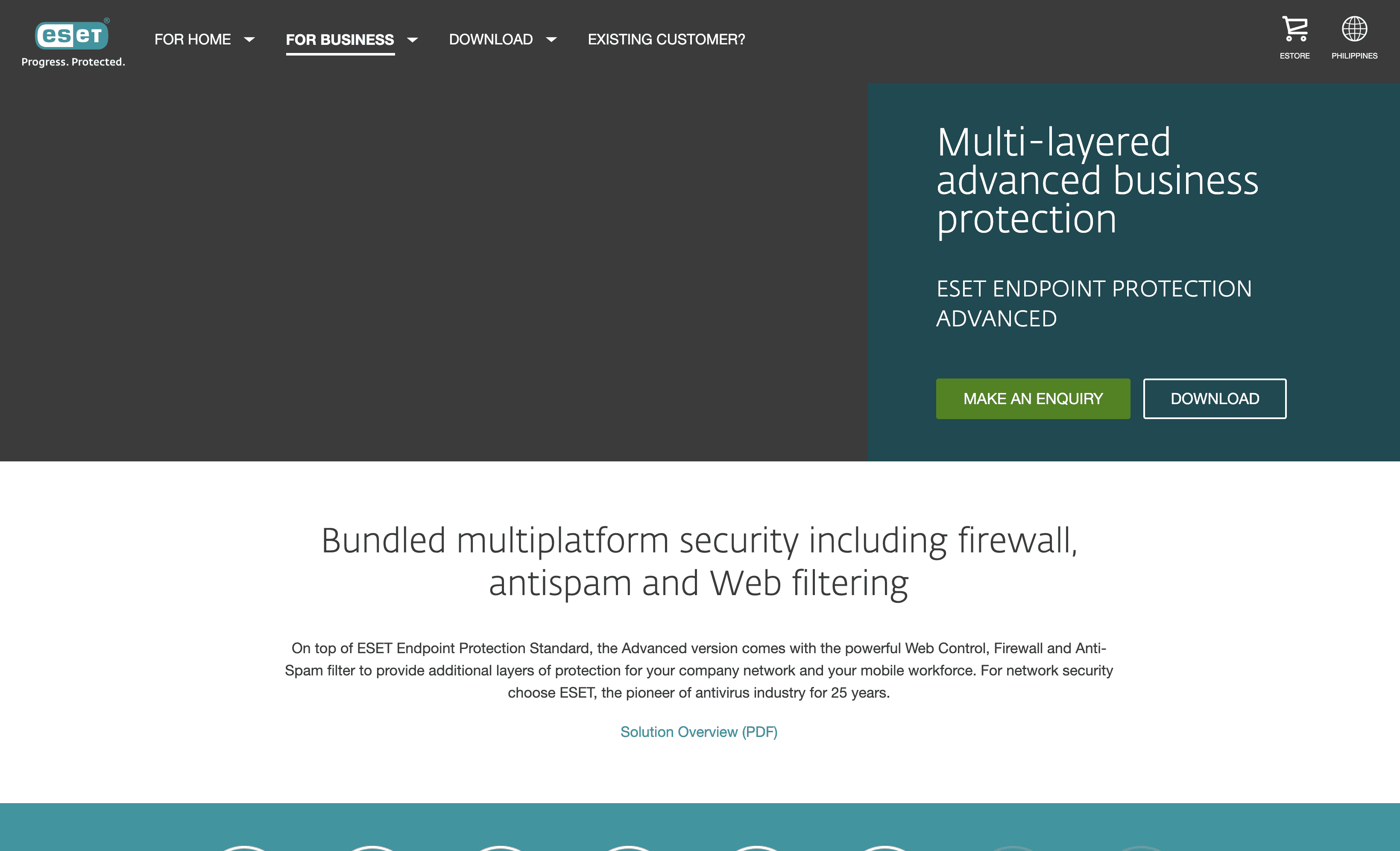
Eset Endpoint Protection Advanced is a multi-layered security solution designed to protect business networks and mobile workforces. It offers comprehensive protection with features like endpoint antivirus, mobile security, and remote management, ensuring robust security across various devices and platforms.
Eset Endpoint Protection Advanced Pricing
ESET Endpoint Protection Advanced's pricing is not public. Contact their support for more info.
Eset Endpoint Protection Advanced Reviews
Eset Endpoint Protection Advanced has an overall rating of 4.6 out of 5 stars based on 814 reviews. Users appreciate its ease of deployment and comprehensive protection. Check out more of our reviews here!
Pros and Cons of Eset Endpoint Protection Advanced
Pros:
Multi-layered Security: ESET Endpoint Protection Advanced offers comprehensive protection with firewall, antispam, and web filtering, ensuring robust defense against various threats.
Mobile Security: Provides real-time protection for Android and iOS devices, including anti-phishing and application control, safeguarding mobile workforces.
Remote Management: Centralized management for Windows, Mac, Linux, virtual machines, and smartphones simplifies administration and enhances control.
Cons:
Complexity: Multi-layered security solutions can be complex to configure and manage, requiring significant expertise and time.
Resource Usage: Although optimized, ESET Endpoint Protection Advanced can still consume system resources, potentially affecting performance.
Cost: Advanced security solutions may come at a higher cost compared to basic ones, which might be a concern for smaller organizations.
8. Bitdefender GravityZone Business Security
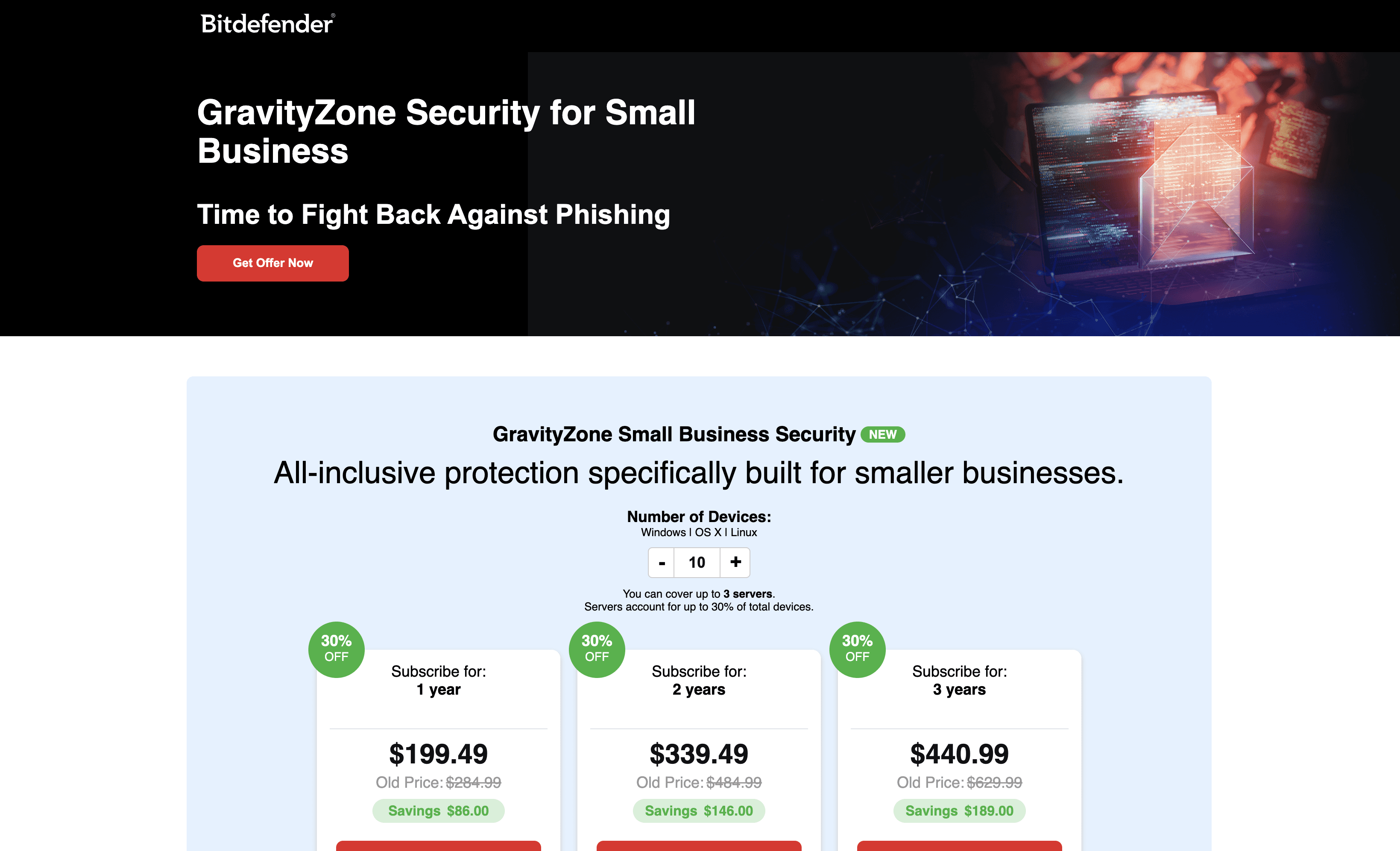
Bitdefender GravityZone Business Security is a cybersecurity solution designed to protect small businesses with comprehensive features like anti-phishing, ransomware protection, and fraud prevention. It offers easy management through a single console, making it accessible for organizations without dedicated IT security staff.
Bitdefender GravityZone Business Security Pricing
1 Year Subscription: $199.49
2 Years Subscription: $339.49
3 Years Subscription: $440.99
Bitdefender GravityZone Business Security Reviews
Bitdefender GravityZone Business Security has an overall rating of 4.0 out of 5 stars based on 65 reviews. Users appreciate its comprehensive protection and ease of use. Check out more of our reviews here!
Pros and Cons of Bitdefender GravityZone Business Security
Pros:
Effective Anti-Phishing: Blocks known phishing pages and provides adaptive defense against online scams.
Ransomware Protection: Multiple layers of defense against ransomware, ensuring data safety.
Single Console Management: Simplifies security management for small businesses, making it accessible even without dedicated IT staff.
Cons:
Complex Interface: Some users find the interface difficult to navigate, requiring a learning curve.
Subscription Requirement: Continuous protection necessitates a paid subscription after the trial period.
Limited to Small Businesses: Specifically designed for smaller businesses, which may not be suitable for larger enterprises.
9. F-Secure Elements
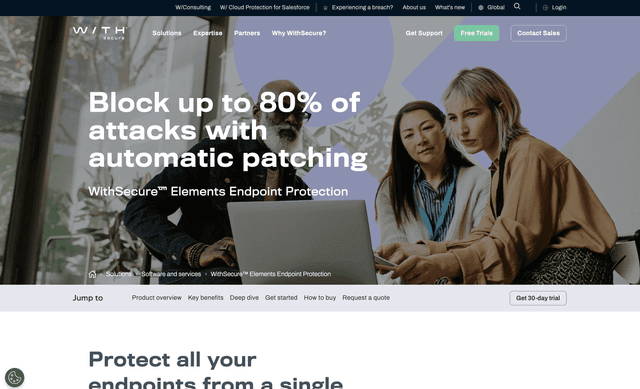
F-Secure Elements is a cloud-native endpoint protection solution designed to safeguard various devices from advanced threats. It offers features like automated patch management, multi-engine malware protection, and cloud-based threat analysis. With its focus on ease of use and comprehensive security, F-Secure Elements aims to protect businesses of all sizes.
F-Secure Elements Pricing
F-Secure Elements's pricing is not public. Contact their support for more info.
F-Secure Elements Reviews
F-Secure Elements has an overall rating of 4.4 out of 5 stars based on 17 reviews. Users appreciate its ease of deployment and detailed reports. Check out more of our reviews here!
Pros and Cons of F-Secure Elements
Pros:
Automated Patch Management: Blocks up to 80% of ransomware attacks, ensuring robust protection.
Multi-engine Malware Protection: Provides comprehensive defense against various malware types, enhancing security.
Cloud-based Threat Analysis: Offers advanced detection and analysis, improving threat response.
Cons:
Premium Features: Advanced features like DataGuard and Endpoint Encryption are only available in the premium version.
Complexity for Small Businesses: The extensive range of features may overwhelm smaller organizations.
Dependence on Cloud: Requires a reliable internet connection for optimal performance and management.
10. Sophos Intercept X Endpoint Protection
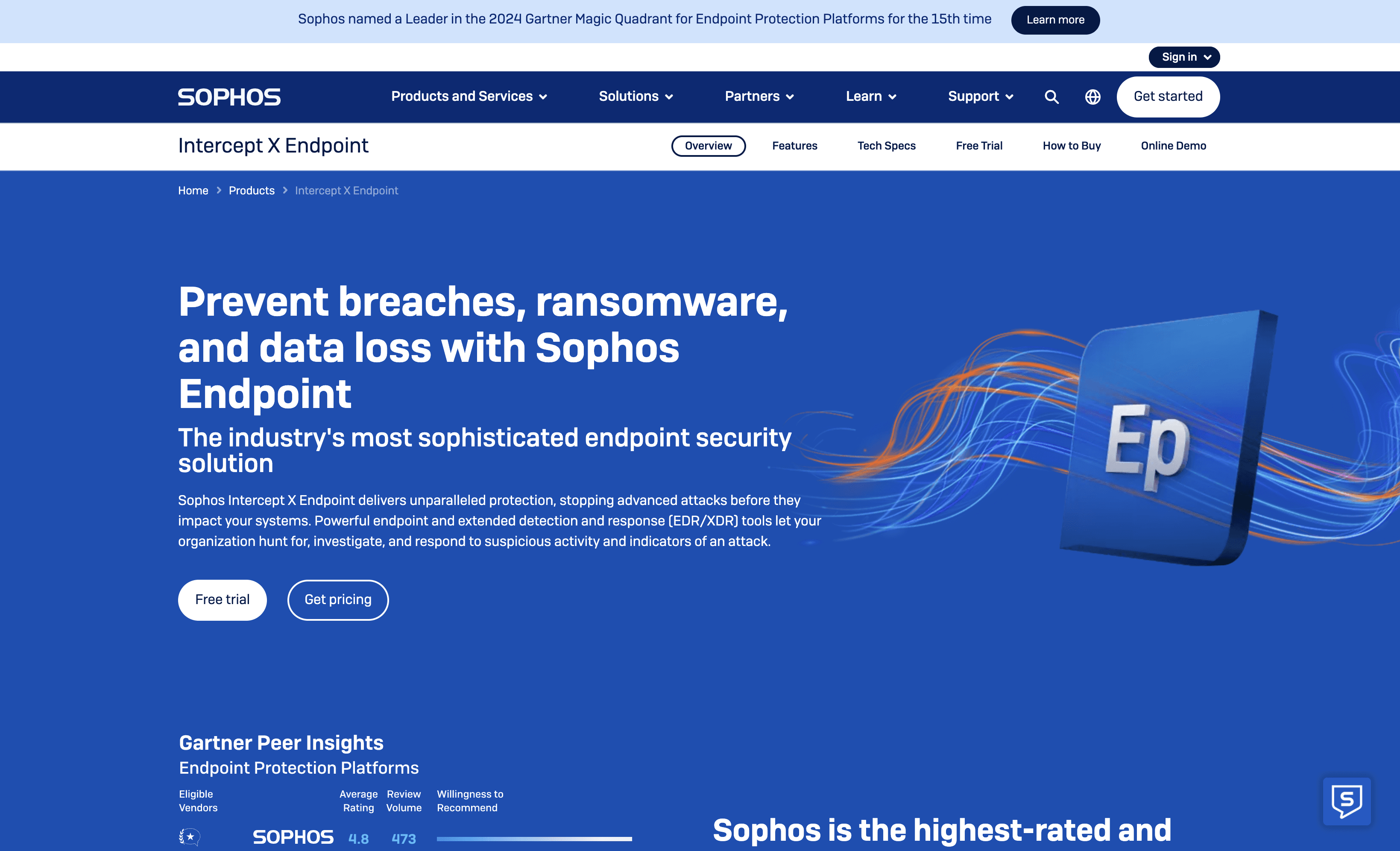
Sophos Intercept X Endpoint Protection is a cybersecurity solution designed to safeguard devices with advanced threat detection and response capabilities. It combines AI, behavioral analysis, and anti-ransomware technologies to prevent breaches and data loss. With easy deployment and management through Sophos Central, it aims to protect businesses of all sizes.
Sophos Intercept X Endpoint Protection Pricing
Advanced
Advanced with XDR
Advanced with MDR Complete
Sophos Intercept X Endpoint Protection's pricing is not public. Contact their support for more info.
Sophos Intercept X Endpoint Protection Reviews
Sophos Intercept X Endpoint Protection has an overall rating of 3.9 out of 5 stars based on 30 reviews. Users appreciate its ease of use and effective ransomware protection. Check out more of our reviews here!
Pros and Cons of Sophos Intercept X Endpoint Protection
Pros:
Effective Against Ransomware: Sophos Intercept X's CryptoGuard technology provides real-time protection and automatic rollback of affected files.
Comprehensive Security: Utilizes AI, behavioral analysis, and anti-exploitation technologies to prevent breaches and data loss.
Easy Management: Cloud-based management via Sophos Central with strong default protection settings and granular control options.
Cons:
Complexity: The sophisticated nature of the solution might require a learning curve for new users.
Cost: Advanced features and managed services like MDR might come at a higher cost, which could be a consideration for smaller organizations.
Resource Requirements: Continuous monitoring and management might require dedicated IT resources.
Looking to secure your technical infrastructure?
Twingate offers granular access controls and deployment automations to protect your VPC environment. By leveraging Zero Trust security tools, Twingate ensures that private resources and internet traffic remain secure, enabling companies to innovate faster and stay protected. Try Twingate for Free today!
Rapidly implement a modern Zero Trust network that is more secure and maintainable than VPNs.
The Best 10 Alternatives to Ivanti Endpoint Security (+ Pricing & Reviews)
Twingate Team
•
Jul 27, 2024

Ivanti Endpoint Security provides comprehensive protection for organizational devices and the data they access, blocking threats like ransomware and phishing. While it offers robust features, it might not be the choice for everyone. This article explores the importance of secure access to private resources for distributed workforces.

10 Alternatives to Ivanti Endpoint Security
1. Carbon Black

Carbon Black is a cybersecurity solution designed to protect endpoints from advanced threats. It offers real-time visibility and comprehensive threat detection, making it suitable for businesses of all sizes. With its focus on proactive security measures, Carbon Black aims to safeguard critical data and systems effectively.
Carbon Black Pricing
Carbon Black's pricing is not public. Contact their support for more info.
Carbon Black Reviews
Carbon Black has an overall rating of 4.3 out of 5 stars based on 37 reviews. Users appreciate its ease of installation and robust protection features. Check out more of our reviews here!
Pros and Cons of Carbon Black
Pros:
Carbon Black offers robust cybersecurity protection, effectively defending against ransomware and emerging threats, making it a reliable choice for safeguarding critical data.
Users appreciate the ease of installation, which simplifies the deployment process and reduces the time required to get the system up and running.
The platform provides comprehensive monitoring capabilities, allowing for real-time visibility into potential threats and ensuring proactive security measures.
Cons:
Some users report issues with agent removal, which can complicate the process of uninstalling the software from devices.
There are complaints about complex installation procedures, which may require additional technical expertise and time to complete.
Delay issues have been noted, potentially affecting the performance and responsiveness of the security platform during critical operations.
2. Vipre EDR

Vipre EDR is a cybersecurity solution designed to protect endpoints with advanced threat detection and response capabilities. It focuses on ease of installation, AI-powered investigation, and mobile accessibility, making it suitable for businesses of all sizes. Vipre EDR aims to provide comprehensive security with minimal complexity.
Vipre EDR Pricing
Vipre EDR's pricing is not public. Contact their support for more info.
Vipre EDR Reviews
Vipre EDR has an overall rating of 4.2 out of 5 stars based on 15 reviews. Users appreciate its ease of installation and robust threat detection. Check out more of our reviews here!
Pros and Cons ofVipre EDR
Pros:
Vipre EDR offers easy installation and use, ensuring that even non-technical users can set it up without hassle.
Its ransomware prevention and rollback feature uses AI to detect and neutralize threats in real-time, providing robust protection.
With a complete view of threat behavior, users can quickly identify and remediate security issues from a centralized dashboard.
Cons:
Some users report limited reviews, making it difficult to gauge the product's performance based on user feedback.
The complexity of advanced features may require additional training for full utilization, posing a challenge for smaller teams.
There are concerns about limited features on the claimed profile, suggesting the need for more comprehensive information and user engagement.
3. Symantec

Symantec is a cybersecurity solution designed to protect large enterprises with data-centric hybrid security. It offers comprehensive protection across devices, private data centers, and the cloud. With advanced AI algorithms and seamless integration capabilities, Symantec aims to safeguard critical assets and ensure compliance across the infrastructure.
Symantec Pricing
Symantec's pricing is not public. Contact their support for more info.
Symantec Reviews
Symantec has an overall rating of 4.2 out of 5 stars based on 15 reviews. Users appreciate its comprehensive protection and ease of integration. Check out more of our reviews here!
Pros and Cons of Symantec
Pros:
Comprehensive Security: Symantec offers data-centric hybrid security, protecting devices, private data centers, and the cloud.
Consistent Compliance: Manages compliance controls uniformly across the entire infrastructure, ensuring regulatory adherence.
Secure Remote Work: Safeguards critical enterprise assets, enabling secure access from any location.
Cons:
Complexity for Small Enterprises: Advanced features may overwhelm smaller organizations, making it less suitable for them.
Potential Overhead: Extensive security measures can introduce additional management and resource allocation challenges.
Migration Challenges: Transitioning between on-premises and cloud environments may pose difficulties for some organizations.
4. Cisco Secure Endpoint

Cisco Secure Endpoint is a cloud-native solution designed to provide advanced endpoint security. It focuses on quick detection, response, and recovery from attacks, reducing remediation times significantly. With features like powerful EDR capabilities and integrated threat hunting, it aims to streamline investigations and enhance overall security.
Cisco Secure Endpoint Pricing
Cisco Secure Endpoint's pricing is not public. Contact their support for more info.
Cisco Secure Endpoint Reviews
Cisco Secure Endpoint has an overall rating of 4.5 out of 5 stars based on 21 reviews. Users appreciate its ease of use and comprehensive protection. Check out more of our reviews here!
Pros and Cons of Cisco Secure Endpoint
Pros:
Powerful EDR Capabilities: Built-in endpoint detection and response, threat hunting, and risk-based vulnerability management.
Streamlined Investigations: Quick answers about endpoints with Orbital Advanced Search capability.
Integrated XDR Capabilities: Unified view, simplified incident management, and automated playbooks with the SecureX platform.
Cons:
Complexity: The integration of multiple advanced features might be complex for some users to manage.
Cost: High-end security solutions like Cisco Secure Endpoint can be expensive, which might be a concern for smaller organizations.
Learning Curve: The advanced capabilities and integrations might require significant training and expertise to utilize effectively.
5. Absolute Secure Endpoint

Absolute Secure Endpoint is a cybersecurity solution designed to protect devices with advanced threat detection and response. It offers features like self-healing applications and real-time visibility, ensuring robust security for businesses of all sizes. With its focus on ease of use, Absolute aims to simplify endpoint protection.
Absolute Secure Endpoint Pricing
Absolute Secure Endpoint's pricing is not public. Contact their support for more info.
Absolute Secure Endpoint Reviews
Absolute Secure Endpoint has an overall rating of 4.6 out of 5 stars based on 307 reviews. Users appreciate its robust security features and ease of use. Check out more of our reviews here!
Pros and Cons of Absolute Secure Endpoint
Pros:
Comprehensive Device Management: Tracks hardware, monitors device leasing, and reports on installed software, ensuring full visibility and control over all endpoints.
Security Posture Assessment: Provides encryption and anti-malware status reporting, helping organizations maintain a strong security posture.
Remote Actions: Allows remote freezing and data deletion from devices, offering robust measures to protect sensitive information.
Cons:
OS Support Limitations: Some features are limited to specific operating systems, which may restrict functionality for diverse environments.
Feature Availability: Certain advanced features are only available in higher-tier packages, potentially increasing costs for full functionality.
Geographic Restrictions: Some services, like the stolen device recovery guarantee, are limited to specific regions, reducing global applicability.
6. Microsoft Defender for Endpoint

Microsoft Defender for Endpoint is a security solution designed to protect endpoints with industry-leading detection and response capabilities. It offers multiplatform support, AI-powered security, and global threat intelligence, ensuring comprehensive protection for businesses of all sizes. The solution aims to simplify endpoint security while providing robust defense mechanisms.
Microsoft Defender for Endpoint Pricing
Microsoft Defender for Endpoint P1: Included with Microsoft 365 E3.
Microsoft Defender for Endpoint P2: Included with Microsoft 365 E5.
Microsoft Defender for Endpoint Reviews
Microsoft Defender for Endpoint has an overall rating of 4.4 out of 5 stars based on 303 reviews. Users appreciate its comprehensive security features and ease of use. Check out more of our reviews here!
Pros and Cons of Microsoft Defender for Endpoint
Pros:
AI-Powered Security: Utilizes artificial intelligence to detect and neutralize cyber threats, enhancing the security team's efficiency.
Global Threat Intelligence: Offers a comprehensive view of the cyberattack landscape, providing actionable insights and best practices.
Comprehensive Protection: Delivers next-gen antivirus, detection, and response across multiple platforms, including IoT devices.
Cons:
Complexity: Advanced features may require significant expertise and training, posing challenges for less experienced users.
Cost: High-end security solutions, especially those included with Microsoft 365 E5, can be expensive for smaller organizations.
Resource Intensive: Managing and deploying such a robust security solution demands dedicated IT staff and infrastructure.
7. Eset Endpoint Protection Advanced

Eset Endpoint Protection Advanced is a multi-layered security solution designed to protect business networks and mobile workforces. It offers comprehensive protection with features like endpoint antivirus, mobile security, and remote management, ensuring robust security across various devices and platforms.
Eset Endpoint Protection Advanced Pricing
ESET Endpoint Protection Advanced's pricing is not public. Contact their support for more info.
Eset Endpoint Protection Advanced Reviews
Eset Endpoint Protection Advanced has an overall rating of 4.6 out of 5 stars based on 814 reviews. Users appreciate its ease of deployment and comprehensive protection. Check out more of our reviews here!
Pros and Cons of Eset Endpoint Protection Advanced
Pros:
Multi-layered Security: ESET Endpoint Protection Advanced offers comprehensive protection with firewall, antispam, and web filtering, ensuring robust defense against various threats.
Mobile Security: Provides real-time protection for Android and iOS devices, including anti-phishing and application control, safeguarding mobile workforces.
Remote Management: Centralized management for Windows, Mac, Linux, virtual machines, and smartphones simplifies administration and enhances control.
Cons:
Complexity: Multi-layered security solutions can be complex to configure and manage, requiring significant expertise and time.
Resource Usage: Although optimized, ESET Endpoint Protection Advanced can still consume system resources, potentially affecting performance.
Cost: Advanced security solutions may come at a higher cost compared to basic ones, which might be a concern for smaller organizations.
8. Bitdefender GravityZone Business Security

Bitdefender GravityZone Business Security is a cybersecurity solution designed to protect small businesses with comprehensive features like anti-phishing, ransomware protection, and fraud prevention. It offers easy management through a single console, making it accessible for organizations without dedicated IT security staff.
Bitdefender GravityZone Business Security Pricing
1 Year Subscription: $199.49
2 Years Subscription: $339.49
3 Years Subscription: $440.99
Bitdefender GravityZone Business Security Reviews
Bitdefender GravityZone Business Security has an overall rating of 4.0 out of 5 stars based on 65 reviews. Users appreciate its comprehensive protection and ease of use. Check out more of our reviews here!
Pros and Cons of Bitdefender GravityZone Business Security
Pros:
Effective Anti-Phishing: Blocks known phishing pages and provides adaptive defense against online scams.
Ransomware Protection: Multiple layers of defense against ransomware, ensuring data safety.
Single Console Management: Simplifies security management for small businesses, making it accessible even without dedicated IT staff.
Cons:
Complex Interface: Some users find the interface difficult to navigate, requiring a learning curve.
Subscription Requirement: Continuous protection necessitates a paid subscription after the trial period.
Limited to Small Businesses: Specifically designed for smaller businesses, which may not be suitable for larger enterprises.
9. F-Secure Elements

F-Secure Elements is a cloud-native endpoint protection solution designed to safeguard various devices from advanced threats. It offers features like automated patch management, multi-engine malware protection, and cloud-based threat analysis. With its focus on ease of use and comprehensive security, F-Secure Elements aims to protect businesses of all sizes.
F-Secure Elements Pricing
F-Secure Elements's pricing is not public. Contact their support for more info.
F-Secure Elements Reviews
F-Secure Elements has an overall rating of 4.4 out of 5 stars based on 17 reviews. Users appreciate its ease of deployment and detailed reports. Check out more of our reviews here!
Pros and Cons of F-Secure Elements
Pros:
Automated Patch Management: Blocks up to 80% of ransomware attacks, ensuring robust protection.
Multi-engine Malware Protection: Provides comprehensive defense against various malware types, enhancing security.
Cloud-based Threat Analysis: Offers advanced detection and analysis, improving threat response.
Cons:
Premium Features: Advanced features like DataGuard and Endpoint Encryption are only available in the premium version.
Complexity for Small Businesses: The extensive range of features may overwhelm smaller organizations.
Dependence on Cloud: Requires a reliable internet connection for optimal performance and management.
10. Sophos Intercept X Endpoint Protection

Sophos Intercept X Endpoint Protection is a cybersecurity solution designed to safeguard devices with advanced threat detection and response capabilities. It combines AI, behavioral analysis, and anti-ransomware technologies to prevent breaches and data loss. With easy deployment and management through Sophos Central, it aims to protect businesses of all sizes.
Sophos Intercept X Endpoint Protection Pricing
Advanced
Advanced with XDR
Advanced with MDR Complete
Sophos Intercept X Endpoint Protection's pricing is not public. Contact their support for more info.
Sophos Intercept X Endpoint Protection Reviews
Sophos Intercept X Endpoint Protection has an overall rating of 3.9 out of 5 stars based on 30 reviews. Users appreciate its ease of use and effective ransomware protection. Check out more of our reviews here!
Pros and Cons of Sophos Intercept X Endpoint Protection
Pros:
Effective Against Ransomware: Sophos Intercept X's CryptoGuard technology provides real-time protection and automatic rollback of affected files.
Comprehensive Security: Utilizes AI, behavioral analysis, and anti-exploitation technologies to prevent breaches and data loss.
Easy Management: Cloud-based management via Sophos Central with strong default protection settings and granular control options.
Cons:
Complexity: The sophisticated nature of the solution might require a learning curve for new users.
Cost: Advanced features and managed services like MDR might come at a higher cost, which could be a consideration for smaller organizations.
Resource Requirements: Continuous monitoring and management might require dedicated IT resources.
Looking to secure your technical infrastructure?
Twingate offers granular access controls and deployment automations to protect your VPC environment. By leveraging Zero Trust security tools, Twingate ensures that private resources and internet traffic remain secure, enabling companies to innovate faster and stay protected. Try Twingate for Free today!
Rapidly implement a modern Zero Trust network that is more secure and maintainable than VPNs.
The Best 10 Alternatives to Ivanti Endpoint Security (+ Pricing & Reviews)
Twingate Team
•
Jul 27, 2024

Ivanti Endpoint Security provides comprehensive protection for organizational devices and the data they access, blocking threats like ransomware and phishing. While it offers robust features, it might not be the choice for everyone. This article explores the importance of secure access to private resources for distributed workforces.

10 Alternatives to Ivanti Endpoint Security
1. Carbon Black

Carbon Black is a cybersecurity solution designed to protect endpoints from advanced threats. It offers real-time visibility and comprehensive threat detection, making it suitable for businesses of all sizes. With its focus on proactive security measures, Carbon Black aims to safeguard critical data and systems effectively.
Carbon Black Pricing
Carbon Black's pricing is not public. Contact their support for more info.
Carbon Black Reviews
Carbon Black has an overall rating of 4.3 out of 5 stars based on 37 reviews. Users appreciate its ease of installation and robust protection features. Check out more of our reviews here!
Pros and Cons of Carbon Black
Pros:
Carbon Black offers robust cybersecurity protection, effectively defending against ransomware and emerging threats, making it a reliable choice for safeguarding critical data.
Users appreciate the ease of installation, which simplifies the deployment process and reduces the time required to get the system up and running.
The platform provides comprehensive monitoring capabilities, allowing for real-time visibility into potential threats and ensuring proactive security measures.
Cons:
Some users report issues with agent removal, which can complicate the process of uninstalling the software from devices.
There are complaints about complex installation procedures, which may require additional technical expertise and time to complete.
Delay issues have been noted, potentially affecting the performance and responsiveness of the security platform during critical operations.
2. Vipre EDR

Vipre EDR is a cybersecurity solution designed to protect endpoints with advanced threat detection and response capabilities. It focuses on ease of installation, AI-powered investigation, and mobile accessibility, making it suitable for businesses of all sizes. Vipre EDR aims to provide comprehensive security with minimal complexity.
Vipre EDR Pricing
Vipre EDR's pricing is not public. Contact their support for more info.
Vipre EDR Reviews
Vipre EDR has an overall rating of 4.2 out of 5 stars based on 15 reviews. Users appreciate its ease of installation and robust threat detection. Check out more of our reviews here!
Pros and Cons ofVipre EDR
Pros:
Vipre EDR offers easy installation and use, ensuring that even non-technical users can set it up without hassle.
Its ransomware prevention and rollback feature uses AI to detect and neutralize threats in real-time, providing robust protection.
With a complete view of threat behavior, users can quickly identify and remediate security issues from a centralized dashboard.
Cons:
Some users report limited reviews, making it difficult to gauge the product's performance based on user feedback.
The complexity of advanced features may require additional training for full utilization, posing a challenge for smaller teams.
There are concerns about limited features on the claimed profile, suggesting the need for more comprehensive information and user engagement.
3. Symantec

Symantec is a cybersecurity solution designed to protect large enterprises with data-centric hybrid security. It offers comprehensive protection across devices, private data centers, and the cloud. With advanced AI algorithms and seamless integration capabilities, Symantec aims to safeguard critical assets and ensure compliance across the infrastructure.
Symantec Pricing
Symantec's pricing is not public. Contact their support for more info.
Symantec Reviews
Symantec has an overall rating of 4.2 out of 5 stars based on 15 reviews. Users appreciate its comprehensive protection and ease of integration. Check out more of our reviews here!
Pros and Cons of Symantec
Pros:
Comprehensive Security: Symantec offers data-centric hybrid security, protecting devices, private data centers, and the cloud.
Consistent Compliance: Manages compliance controls uniformly across the entire infrastructure, ensuring regulatory adherence.
Secure Remote Work: Safeguards critical enterprise assets, enabling secure access from any location.
Cons:
Complexity for Small Enterprises: Advanced features may overwhelm smaller organizations, making it less suitable for them.
Potential Overhead: Extensive security measures can introduce additional management and resource allocation challenges.
Migration Challenges: Transitioning between on-premises and cloud environments may pose difficulties for some organizations.
4. Cisco Secure Endpoint

Cisco Secure Endpoint is a cloud-native solution designed to provide advanced endpoint security. It focuses on quick detection, response, and recovery from attacks, reducing remediation times significantly. With features like powerful EDR capabilities and integrated threat hunting, it aims to streamline investigations and enhance overall security.
Cisco Secure Endpoint Pricing
Cisco Secure Endpoint's pricing is not public. Contact their support for more info.
Cisco Secure Endpoint Reviews
Cisco Secure Endpoint has an overall rating of 4.5 out of 5 stars based on 21 reviews. Users appreciate its ease of use and comprehensive protection. Check out more of our reviews here!
Pros and Cons of Cisco Secure Endpoint
Pros:
Powerful EDR Capabilities: Built-in endpoint detection and response, threat hunting, and risk-based vulnerability management.
Streamlined Investigations: Quick answers about endpoints with Orbital Advanced Search capability.
Integrated XDR Capabilities: Unified view, simplified incident management, and automated playbooks with the SecureX platform.
Cons:
Complexity: The integration of multiple advanced features might be complex for some users to manage.
Cost: High-end security solutions like Cisco Secure Endpoint can be expensive, which might be a concern for smaller organizations.
Learning Curve: The advanced capabilities and integrations might require significant training and expertise to utilize effectively.
5. Absolute Secure Endpoint

Absolute Secure Endpoint is a cybersecurity solution designed to protect devices with advanced threat detection and response. It offers features like self-healing applications and real-time visibility, ensuring robust security for businesses of all sizes. With its focus on ease of use, Absolute aims to simplify endpoint protection.
Absolute Secure Endpoint Pricing
Absolute Secure Endpoint's pricing is not public. Contact their support for more info.
Absolute Secure Endpoint Reviews
Absolute Secure Endpoint has an overall rating of 4.6 out of 5 stars based on 307 reviews. Users appreciate its robust security features and ease of use. Check out more of our reviews here!
Pros and Cons of Absolute Secure Endpoint
Pros:
Comprehensive Device Management: Tracks hardware, monitors device leasing, and reports on installed software, ensuring full visibility and control over all endpoints.
Security Posture Assessment: Provides encryption and anti-malware status reporting, helping organizations maintain a strong security posture.
Remote Actions: Allows remote freezing and data deletion from devices, offering robust measures to protect sensitive information.
Cons:
OS Support Limitations: Some features are limited to specific operating systems, which may restrict functionality for diverse environments.
Feature Availability: Certain advanced features are only available in higher-tier packages, potentially increasing costs for full functionality.
Geographic Restrictions: Some services, like the stolen device recovery guarantee, are limited to specific regions, reducing global applicability.
6. Microsoft Defender for Endpoint

Microsoft Defender for Endpoint is a security solution designed to protect endpoints with industry-leading detection and response capabilities. It offers multiplatform support, AI-powered security, and global threat intelligence, ensuring comprehensive protection for businesses of all sizes. The solution aims to simplify endpoint security while providing robust defense mechanisms.
Microsoft Defender for Endpoint Pricing
Microsoft Defender for Endpoint P1: Included with Microsoft 365 E3.
Microsoft Defender for Endpoint P2: Included with Microsoft 365 E5.
Microsoft Defender for Endpoint Reviews
Microsoft Defender for Endpoint has an overall rating of 4.4 out of 5 stars based on 303 reviews. Users appreciate its comprehensive security features and ease of use. Check out more of our reviews here!
Pros and Cons of Microsoft Defender for Endpoint
Pros:
AI-Powered Security: Utilizes artificial intelligence to detect and neutralize cyber threats, enhancing the security team's efficiency.
Global Threat Intelligence: Offers a comprehensive view of the cyberattack landscape, providing actionable insights and best practices.
Comprehensive Protection: Delivers next-gen antivirus, detection, and response across multiple platforms, including IoT devices.
Cons:
Complexity: Advanced features may require significant expertise and training, posing challenges for less experienced users.
Cost: High-end security solutions, especially those included with Microsoft 365 E5, can be expensive for smaller organizations.
Resource Intensive: Managing and deploying such a robust security solution demands dedicated IT staff and infrastructure.
7. Eset Endpoint Protection Advanced

Eset Endpoint Protection Advanced is a multi-layered security solution designed to protect business networks and mobile workforces. It offers comprehensive protection with features like endpoint antivirus, mobile security, and remote management, ensuring robust security across various devices and platforms.
Eset Endpoint Protection Advanced Pricing
ESET Endpoint Protection Advanced's pricing is not public. Contact their support for more info.
Eset Endpoint Protection Advanced Reviews
Eset Endpoint Protection Advanced has an overall rating of 4.6 out of 5 stars based on 814 reviews. Users appreciate its ease of deployment and comprehensive protection. Check out more of our reviews here!
Pros and Cons of Eset Endpoint Protection Advanced
Pros:
Multi-layered Security: ESET Endpoint Protection Advanced offers comprehensive protection with firewall, antispam, and web filtering, ensuring robust defense against various threats.
Mobile Security: Provides real-time protection for Android and iOS devices, including anti-phishing and application control, safeguarding mobile workforces.
Remote Management: Centralized management for Windows, Mac, Linux, virtual machines, and smartphones simplifies administration and enhances control.
Cons:
Complexity: Multi-layered security solutions can be complex to configure and manage, requiring significant expertise and time.
Resource Usage: Although optimized, ESET Endpoint Protection Advanced can still consume system resources, potentially affecting performance.
Cost: Advanced security solutions may come at a higher cost compared to basic ones, which might be a concern for smaller organizations.
8. Bitdefender GravityZone Business Security

Bitdefender GravityZone Business Security is a cybersecurity solution designed to protect small businesses with comprehensive features like anti-phishing, ransomware protection, and fraud prevention. It offers easy management through a single console, making it accessible for organizations without dedicated IT security staff.
Bitdefender GravityZone Business Security Pricing
1 Year Subscription: $199.49
2 Years Subscription: $339.49
3 Years Subscription: $440.99
Bitdefender GravityZone Business Security Reviews
Bitdefender GravityZone Business Security has an overall rating of 4.0 out of 5 stars based on 65 reviews. Users appreciate its comprehensive protection and ease of use. Check out more of our reviews here!
Pros and Cons of Bitdefender GravityZone Business Security
Pros:
Effective Anti-Phishing: Blocks known phishing pages and provides adaptive defense against online scams.
Ransomware Protection: Multiple layers of defense against ransomware, ensuring data safety.
Single Console Management: Simplifies security management for small businesses, making it accessible even without dedicated IT staff.
Cons:
Complex Interface: Some users find the interface difficult to navigate, requiring a learning curve.
Subscription Requirement: Continuous protection necessitates a paid subscription after the trial period.
Limited to Small Businesses: Specifically designed for smaller businesses, which may not be suitable for larger enterprises.
9. F-Secure Elements

F-Secure Elements is a cloud-native endpoint protection solution designed to safeguard various devices from advanced threats. It offers features like automated patch management, multi-engine malware protection, and cloud-based threat analysis. With its focus on ease of use and comprehensive security, F-Secure Elements aims to protect businesses of all sizes.
F-Secure Elements Pricing
F-Secure Elements's pricing is not public. Contact their support for more info.
F-Secure Elements Reviews
F-Secure Elements has an overall rating of 4.4 out of 5 stars based on 17 reviews. Users appreciate its ease of deployment and detailed reports. Check out more of our reviews here!
Pros and Cons of F-Secure Elements
Pros:
Automated Patch Management: Blocks up to 80% of ransomware attacks, ensuring robust protection.
Multi-engine Malware Protection: Provides comprehensive defense against various malware types, enhancing security.
Cloud-based Threat Analysis: Offers advanced detection and analysis, improving threat response.
Cons:
Premium Features: Advanced features like DataGuard and Endpoint Encryption are only available in the premium version.
Complexity for Small Businesses: The extensive range of features may overwhelm smaller organizations.
Dependence on Cloud: Requires a reliable internet connection for optimal performance and management.
10. Sophos Intercept X Endpoint Protection

Sophos Intercept X Endpoint Protection is a cybersecurity solution designed to safeguard devices with advanced threat detection and response capabilities. It combines AI, behavioral analysis, and anti-ransomware technologies to prevent breaches and data loss. With easy deployment and management through Sophos Central, it aims to protect businesses of all sizes.
Sophos Intercept X Endpoint Protection Pricing
Advanced
Advanced with XDR
Advanced with MDR Complete
Sophos Intercept X Endpoint Protection's pricing is not public. Contact their support for more info.
Sophos Intercept X Endpoint Protection Reviews
Sophos Intercept X Endpoint Protection has an overall rating of 3.9 out of 5 stars based on 30 reviews. Users appreciate its ease of use and effective ransomware protection. Check out more of our reviews here!
Pros and Cons of Sophos Intercept X Endpoint Protection
Pros:
Effective Against Ransomware: Sophos Intercept X's CryptoGuard technology provides real-time protection and automatic rollback of affected files.
Comprehensive Security: Utilizes AI, behavioral analysis, and anti-exploitation technologies to prevent breaches and data loss.
Easy Management: Cloud-based management via Sophos Central with strong default protection settings and granular control options.
Cons:
Complexity: The sophisticated nature of the solution might require a learning curve for new users.
Cost: Advanced features and managed services like MDR might come at a higher cost, which could be a consideration for smaller organizations.
Resource Requirements: Continuous monitoring and management might require dedicated IT resources.
Looking to secure your technical infrastructure?
Twingate offers granular access controls and deployment automations to protect your VPC environment. By leveraging Zero Trust security tools, Twingate ensures that private resources and internet traffic remain secure, enabling companies to innovate faster and stay protected. Try Twingate for Free today!
Solutions
Solutions
The VPN replacement your workforce will love.
Solutions